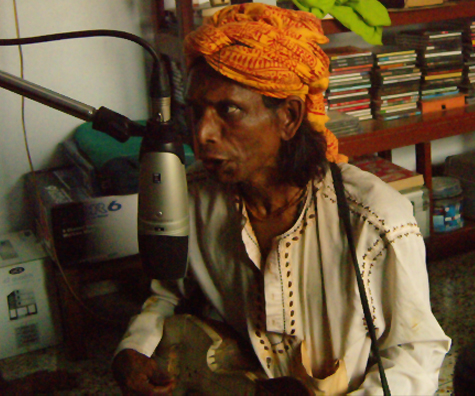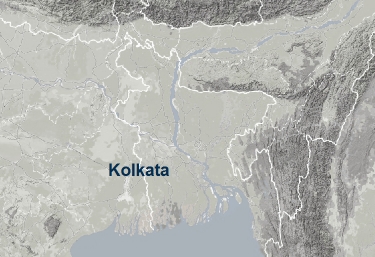Thank you for your comment, Mary. I agree with you that we should step aside and just listen to Bhakta Das for the song he is giving to us. There is never one authentic version of the text, hence this would be Bhakta Das’ version of Bijoy Sarkar. But, as you know, these songs also carry the signature of the poet–the last verse will go with a line like, Pagol Bijoy (Bijoy, the mad lover) says, and so on. That makes the matter more complicated. When we see a songbook of Bijoy, we will find the text. Is that the version of the poet? Again, depends on who is putting together the text, the process of collecting and compiling and reasons for editorial decisions. How did Bijoy write? Who did his scribe get the song from and so on. Actually, if we are thinking academically, then I would say that it might be interesting to look at multiple versions of the same text, because that then brings out the multiple voices which exist within oral traditions. For me, neither the song nor tradition are fixed entities.
Jadavpur, Kolkata, 30 May 2010, Bhakta Das
posha pakhi ure jabe
Bhakta Das has been coming to Kolkata for many years as a wandering singer, roaming from street to street, sleeping in the Dakshineswar Kali temple at night, and then going back to his house in the North 24-Parganas of West Bengal, near the Bongaon border with Bangladesh. We had heard him first time when his clear voice wafted with the breeze into our room in Jadavpur, Kolkata one spring morning. There are such singers who sometimes visit the neighbourhood, but we don’t always pay heed. Bhakta Das seemed different. So I went down and met him and invited him upstairs. This recording session took place in our apartment, in Sukanta’s improvised ‘studio’ (which comprises a couple of computers and microphones). Bhakta Das sang in the style of the singers of Faridpur and when asked, it turned out that we had guessed right; his old home was indeed in that region. But he had also left the place about 40 years ago, at the time of the Bangladesh Liberation War, as a very young boy. So then, how come he still retained such a style of singing? In fact, it wasn’t really a case of retention, the more apt question would be, how come he acquired such a style? Bhakta Das said though that where he lived there were entire Bangladeshi villages which had moved over from the other side. There were teams which sang kirtan and had sessions of kobigaan, Tinnather gaan and so on, such as they did in their old home.

Bhakta Das
Here we have a very popular composition of Bijoy Sarkar, which anyone from that region would know. Ibrahim Boyati of Faridpur also sang it song. Bhakta Das sings his own version of the song; he keeps the basic structure of the song and mixes up the verses. Why does this happen? Is it because he does not know or is it because it does not matter to him to change the text? There is a certain naturalness in the way the text comes out in Bhakta Das’ song. Is it then in the nature of oral traditions that such changes occur?
I have presented here the text that Bhakta Das sang in our room and I did not attempt to write down a more ‘authentic’ version. The question that comes out this session is, how do we write about music, especially music that is part of an oral tradition? Do we write down what we hear or try to write ‘what we know to be true?’
Written in 2011.
- Saptiguri, North Bengal. 27 November 2003. Nirmala Roy
- Bolpur, Birbhum. 25 November 2003. Nimai Chand Baul
- Kolkata. 4 September 2019. Purnadas on Nabani Das Baul
- Surma News Office, Quaker Street, East London. 27 February 2007. Ahmed Moyez
- Ambikapur, Faridpur, Bangladesh. 29 April 2006. Hajera Bibi
- Sylhet, Bangladesh. 22 April 2006. Chandrabati Roy Barman and Sushoma Das
- Sylhet, Bangladesh. 21 April 2006. Arkum Shah Mazar
- Sylhet, Bangladesh. 20-21 April 2006. Ruhi Thakur and others
- Jahajpur, Purulia. 27 February 2006. Naren Hansda and others
- Faridpur, Bangladesh. 24 January 2006. Binoy Nath
- Uttar Shobharampur, Faridpur, Bangladesh. 22 January 2006. Ibrahim Boyati
- Baotipara, Faridpur, Bangladesh. 21 January 2006. Kusumbala Mondal and others
- Kumar Nodi, Faridpur, Bangladesh. 21 January 2006. Idris Majhi and Sadek Ali
- Debicharan, Rangpur, Bangladesh 18 January 2006 Anurupa Roy & Mini Roy, Shopon Das
- Mahiganj, Rangpur, Bangladesh. 17 January 2006. Biswanath Mahanta & Digen Roy
- Chitarpur, Kotshila, Purulia. 28 November 2005. Musurabala
- Krishnai, Goalpara, Assam. 30 August 2005. Rahima Kolita
- Chandrapur,Cachar. 28 August 2005. Janmashtami
- Silchar, 25 August 2005, Barindra Das
- Kenduli,Birbhum. 14 January 2005. Fulmala Dasi
- Kenduli, Birbhum. 13 January 2005. Ashalata Mandal
- Shaspur, Birbhum. 8 January 2005. Golam Shah and sons Salam and Jamir
- Bhaddi, Purulia. 6 January 2005. Amulya Kumar, Hari Kumar
- Srimangal, Sylhet. 27 December 2004. Tea garden singers
- Sylhet, Bangladesh. 26 December 2004. Abdul Hamid
- Dhaka, Bangladesh. 24 December 2004. Ali Akbar
- Dhaka, Bangladesh. 23 December 2004. Monjila
- Changrabandha, Coochbehar. 16 December 2004. Abhay Roy
- Santiniketan, Birbhum 27 Nov 2004 Debdas Baul, Nandarani
- Tarapith, Birbhum. 14 October 2004. Kanai Das Baul



Bhakta Das’ voice is beautiful and natural. I feel he is singing what he “knows to be true”. To write about it, I’d say we step aside from what we “know to be true” and write about what we are hearing from him.